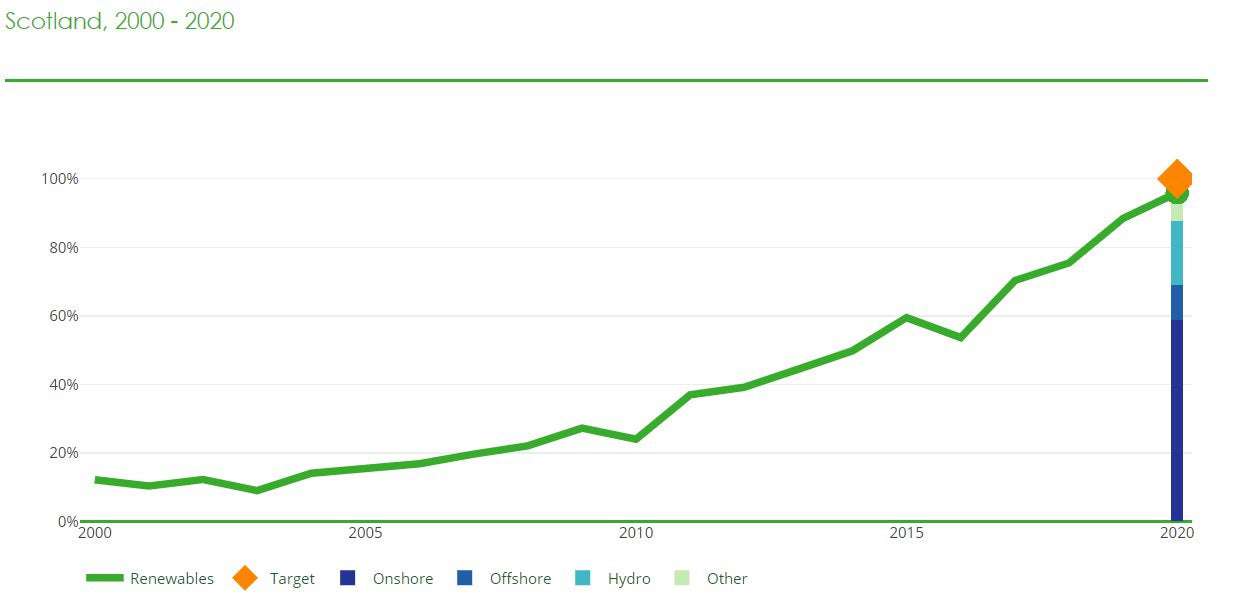Half a century after it was constructed, the Longannet coal-fired power plant in Fife has been demolished.
The explosion marked the end of coal-fired power generation in Scotland.
Renewable energy output in Scotland has more than tripled in the past decade. In 2020, renewables generated 97% of the country’s gross energy consumption.
Scotland aims to be ‘net-zero’ by 2045.
Scotland’s last remaining coal-fired power plant has been blown up, a visual reminder of the country’s transition away from fossil fuels to embrace net-zero emissions.
First Minister Nicola Sturgeon pushed the button on a controlled explosion that reduced the decommissioned 600-foot Longannet chimney to rubble.
Scottish Power closed the plant in 2016, marking the end of coal-fired power generation in the country.
A gas-fired power plant in Peterhead, Aberdeenshire is the last remaining link to a fossil-fuelled past, and policymakers’ sights are set firmly on a clean energy future.
In 2020, the equivalent of 97.4% of Scotland’s gross electricity consumption was generated from renewables like onshore and offshore wind and hydro. Although falling just short of the 100% renewables by 2020 target, this figure - corrected from a previously declared lower figure of 93.2% - has been increasing rapidly throughout the past decade, up from just 37% in 2011.
Share of renewable electricity in gross final consumption
Renewable energy output in Scotland has tripled in the past decade. Image: Scottish Government
Sustainable energy has tripled in the past 10 years, according to industry body Scottish Renewables.
“Renewable energy projects are displacing tens of millions of tonnes of carbon every year, employing the equivalent of 17,700 people and bringing enormous socio-economic benefits to communities,” Chief Executive of Scottish Renewables Claire Mack, told the BBC.
Scotland’s ambitious Climate Change Plan establishes a legally binding target of reaching net-zero emissions - where more CO2 emissions are removed from the atmosphere than are generated - by 2045.
Hitting this target means policymakers will need to put measures in place to decarbonize hard-to-electrify sectors like heat and transport, by switching to alternative fuels like clean hydrogen, for example.
The governing Scottish National Party has joined with Green Party Members of the Scottish Parliament (MSPs) to support the country’s transition to a net-zero economy. A $660 million (£500 million) energy transition fund will help refocus the high-carbon economies of fossil-fuel industries like oil and gas in Aberdeen and the north-east of Scotland. The fund will boost jobs and investment in developing low-carbon technologies like offshore wind and marine renewables, hydrogen and carbon capture, utilization and storage (CCUS).

dark_stars on December 18th, 2021 at 15:56 UTC »
Didn’t the electricity price reach 1500 GBPthe other day due to shortages?
Genesis1701d on December 18th, 2021 at 14:54 UTC »
Article says they "produced the equivalent of 97% renewable electricity." Other websites including BBC just say straight up it's 97%. These figures are incredibly misleading.
Only about 50% of Scotland's electricity consumption comes from renewables. The rest is nuclear and fossil fuels. The reason they can say 97% is they generate a lot of extra electricity with renewables but can't use it because it's not on demand so they either export it or it just goes to waste.
Source: https://scotland.shinyapps.io/Energy/?Section=RenLowCarbon&Subsection=RenElec&Chart=ElecConsumptionFuel
GamerGirlBarbiex on December 18th, 2021 at 14:29 UTC »
As an Australian I wish Australia would stop being such dick bags about climate change and join the rest of the world in doing cool shit like this.